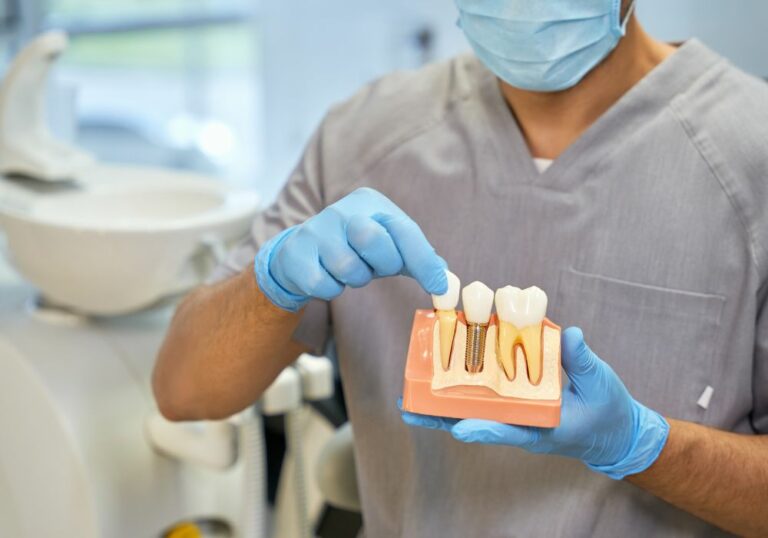A Closer Look at Wisdom Teeth Swelling
Swelling after wisdom tooth extraction is an entirely normal response as the body undergoes the inflammatory healing process. But what exactly causes this puffiness and edema?
When a wisdom tooth is removed, the gums and bone tissue around it experience trauma. This triggers the release of biochemicals called prostaglandins that mediate the localized inflammatory response.
In addition, tiny blood vessels are ruptured during the extraction. This causes bleeding under the gums that pools and adds to facial swelling. The blood flow to the area also increases to bring nutrients and healing factors, further adding to inflammation.
The body’s inflammatory response aims to remove debris and bacteria, while fluid rushes to the area to bring immune cells. This influx of fluid fills up the surgical site and surrounding tissues, leading to significant swelling and puffiness. The swelling puts pressure on nerve endings, causing post-op pain.
Let’s look at the key changes that occur:
- Vasodilation – Blood vessels dilate to allow more blood flow
- Vascular permeability – Capillaries become more permeable, allowing fluid and proteins to leak out into tissues
- Fluid shift – Plasma and leukocytes exit the bloodstream and enter tissue spaces
- Prostaglandin release – Inflammation mediators amp up the swelling response
- Edema – Fluid accumulation in the interstitial spaces of tissue causes swelling
This inflammatory swelling is part of the normal healing process, but can seem pronounced after wisdom teeth removal due to the delicate nature of oral tissues. Fortunately, it is temporary.
Impacted Wisdom Teeth and Swelling
One factor that significantly influences wisdom tooth swelling duration is whether the tooth was impacted.
Impacted wisdom teeth are partially or fully trapped below the gums and bone. They often come in at odd angles or don’t fully erupt. Impactions range from mild to severe.
Extracting impacted wisdom teeth is more invasive than routine extractions. The surgeon may need to cut away gum tissue, remove bone, and section the tooth for removal.
This extensive surgical manipulation causes increased bleeding, tissue trauma, and damage to the periodontal ligament. So it’s no surprise that swelling tends to be more severe and lasts longer when wisdom teeth are impacted.
According to one study, the average duration of facial swelling after impacted wisdom tooth removal was 4.2 days, versus 2.4 days for non-impacted extractions (Metin et al., 2016).
The location and depth of impaction also plays a role. Swelling has been found to persist longer when lower wisdom teeth are impacted versus uppers. This is likely because lower extractions cause more muscular trauma.
Likewise, partial bony impactions lead to more swelling than soft tissue impactions. Full bony impactions have the longest recovery swelling due to needing full exposure of the tooth.
Can Wisdom Tooth Swelling Be Prevented?

While wisdom tooth swelling cannot be avoided completely, certain measures can help control inflammation:
–Pre-operative anti-inflammatory medication – Taking NSAIDs like ibuprofen before surgery has been shown to significantly reduce post-op swelling compared to placebo.
–Local anesthetic – Long-acting local anesthetics at the surgical site can minimize swelling by vasoconstriction of blood vessels.
–Corticosteroid injection – Injectable steroids may be given during extraction to reduce inflammatory chemicals.
–Cold compression – Icing the face for the first 48 hours limits vascular changes that contribute to edema.
–Enzyme inhibitors – Medications like serrapeptase claim to reduce inflammatory prostaglandins, but lack strong evidence.
–Herbal remedies – Some herbal supplements may have minor anti-inflammatory properties to help swelling.
–Good oral hygiene – Preventing infection reduces secondary swelling due to bacteria.
Talk to your oral surgeon if you wish to explore medications or herbs to control wisdom tooth swelling pre or post-op. But moderate swelling is generally unavoidable.
Daily Tips for Recovering from Wisdom Tooth Swelling
Here are some daily self-care tips to help your face recover smoothly after wisdom tooth extraction swelling:
Day 1
- Apply ice packs to reduce initial swelling
- Take prescribed pain relievers as needed
- Stick to soft, cool foods like yogurt, applesauce, milkshakes
Day 2
- Use ice packs throughout the day to “pump the brakes” on swelling
- Sleep propped up on pillows to prevent fluid buildup
- Avoid strenuous activity that can worsen swelling
- Do saltwater rinses if directed after 24 hours
Day 3
- Apply moist heat instead of ice to dilate blood vessels
- Take an anti-inflammatory like ibuprofen to reduce swelling
- Eat soft, nutritious foods like soups, eggs, mashed fruits
- Clean teeth gently with a soft brush in non-surgical areas
Day 4
- Swelling should start to slowly improve today
- Use warm compresses on cheeks for comfort
- Try facial massages to increase lymph drainage
- Begin reintroducing solid foods that require light chewing
Day 5
- Swelling may migrate slightly as it continues resolving
- Keep extraction sites clean with saline rinses
- Start light activities but avoid exertion
- Sleep with head elevated to prevent fluid retaining in face
Day 6
- Consistency of foods can begin returning to normal
- Strengthen oral hygiene routine as swelling subsides
- Limit salty foods that can contribute to fluid retention
- Do not resume vigorous exercise until swelling has resolved
Day 7
- Daily saltwater rinses should continue for 7-14 days
- Swelling is likely minimal but may persist slightly
- Can likely return to work/school if swelling is not severe
Be patient through the recovery process – it takes time for wisdom tooth swelling to fully resolve. But if you follow post-op instructions diligently each day, you will get back to normal gradually. Contact your oral surgeon with any concerns.
Foods to Eat During Wisdom Tooth Swelling

Eating can be challenging in the first few days after wisdom teeth removal while you have swelling and soreness. Follow a soft diet to allow gentle chewing without disturbing the surgical sites. Here are some nutritious food options:
- Drinks – Water, fruit smoothies, milkshakes, herbal tea
- Dairy – Yogurt, pudding, ice cream, cottage cheese
- Fruits – Applesauce, blended fruit, banana, melon
- Vegetables – Mashed potatoes, steamed carrots, creamed spinach, vegetable soup
- Proteins – Eggs, hummus, tuna salad, ground chicken, bean soup
- Grains – Oatmeal, cream of wheat, grits, rice porridge, pasta
- Breads – Soft bread, rolls, tortillas, pancakes, waffles
- Desserts – Jello, fruit sauce, pie filling, frozen yogurt
- Beverages – Nutritional shakes, diluted juices, electrolyte water
After the first 5-7 days, you can gradually begin reintroducing firmer items like soups with soft vegetables, fish, biscuits, and cooked grains. But take it slowly. Let your comfort guide you. And ask your dentist when you can return to your normal diet.
Wisdom Tooth Swelling Complications
While wisdom tooth extraction swelling is normal, certain complications can occasionally arise:
- Infection – Swelling beyond 3 days may indicate a localized infection like dry socket. Look for pain, bad taste, fever. See a dentist promptly.
- Bleeding – Oozing blood from the socket after 24 hours may reflect poor clotting. Apply pressure or return for an exam.
- Nerve damage – Rarely, wisdom teeth surgery causes nerve injury that leads to numbness or paresthesia. This may indicate swelling is compressing nerves.
- Trismus – Severe swelling results in restricted mouth opening, called trismus. Gentle jaw exercises can help.
- Airway blockage – Rapid onset swelling closing off the throat is an emergency. Seek immediate medical care.
- Sinus involvement – Upper wisdom teeth can sometimes displace sinus membranes, allowing fluid buildup in sinus cavities.
- Allergic reaction – Swelling may persist due to rare allergic reaction to anesthetics or antibiotics. Seek evaluation.
- Underlying conditions – Medical issues like autoimmune disease can contribute to excessive wisdom tooth swelling.
Let your oral surgeon know if you experience any concerning or worsening symptoms after wisdom teeth removal. Proper treatment can get you back on track with healing.
When to See an Oral Surgeon About Swelling

Make sure to follow up with the surgeon who performed your wisdom tooth extraction if you have any of the following:
- Swelling that worsens or spreads days after surgery
- Severe swelling lasting over 2 weeks
- Swelling accompanied by fever, chills, or malaise
- Suddenonset swelling that seems abnormal
- Facial bruising or moderate bleeding from sockets
- Severe throbbing pain not relieved by medication
- Pus discharge or foul odor from extraction sites
- Difficulty breathing, swallowing, or opening your mouth
The surgeon will examine your mouth to determine if any complications are present and provide appropriate treatment. For example, antibiotics may be prescribed for an infection contributing to wisdom tooth swelling.
Rarely, severe swelling requires hospitalization for intravenous medications or close observation. But in most cases, wisdom tooth extraction swelling just needs a little extra time and care to resolve properly.
Don’t hesitate to call the surgeon with any concerns during your recovery. Treating swelling early prevents more serious complications down the road.
Conclusion
Getting your wisdom teeth removed is extremely common, with over 5 million extractions occurring annually just in the United States. It is often recommended when wisdom teeth become impacted or cause issues.
Extraction is relatively straightforward. However, the wisdom tooth swelling that follows can seem daunting, transforming your face temporarily.
Fortunately swelling is simply part of the body’s normal inflammatory healing process after surgery. It peaks on days 2 and 3 before gradually declining over the next 7 to 14 days. Most facial puffiness resolves within 2 weeks.
While wisdom tooth swelling cannot be avoided, icing your face, taking anti-inflammatories, eating soft foods, and resting all help control inflammation during recovery. Proper oral hygiene and post-op care are also key.
Impacted wisdom teeth that require more invasive removal tend to have more severe, prolonged swelling. But even this resolves with time. Contact your oral surgeon if any signs of infection or complications arise.
Overall, expect moderate wisdom tooth swelling for around 1-2 weeks after extraction as your mouth recovers. But don’t hesitate to seek medical advice for severe or worsening symptoms. With proper management, you’ll be back to your normal self before you know it.







